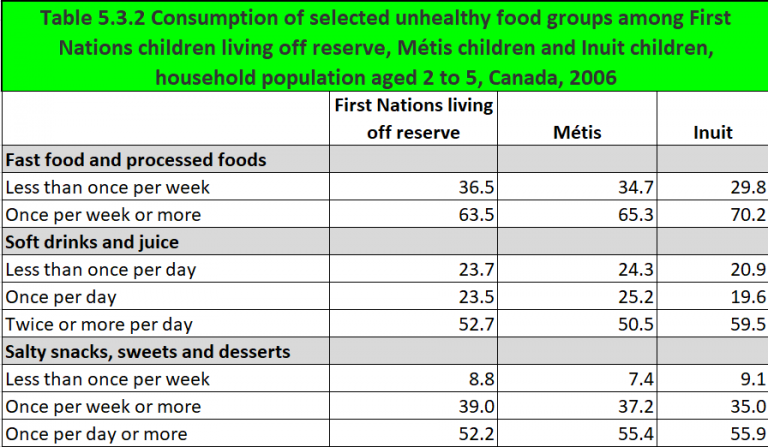Consumption of selected unhealthy food groups among First Nations children living off reserve, Métis children and Inuit children, household population aged 2 to 5, Canada, 2006

Source: CICH graphic created using data adapted from Statistics Canada. 2006 Aboriginal Children’s Survey. http://www.statcan.gc.ca/pub/82-003-x/2013004/article/11776-eng.htm -accessed August 22, 2017.
In 2006, over 60% of First Nations children living off reserve, Métis children and Inuit children aged 2 to 5 ate fast or processed food once a week or more.
Soft drinks and/or juice were consumed by over 50% of First Nations children living off reserve, Métis children and Inuit children aged 2 to 5, twice or more per day. Twice or more is over double the once a day consumption rate.
Over 50% of Inuit, First Nations children living off reserve and Métis children aged 2 to 5 ate salty snacks, sweets and desserts daily.
Implications
Young Indigenous children consume a high proportion of unhealthy and processed foods, soft drinks and juices, and salty snacks and sweet desserts. These foods can often be obtained at a lower cost than healthy foods. Access to healthy foods is important for preventing childhood obesity, which can lead to numerous health consequences in childhood and later in life, including diabetes and cardiovascular diseases. While no comprehensive assessments of obesity in Indigenous preschoolers exist, evidence from several studies indicates that rates are high.1
1See for example, Willows, N.D., Johnson, M.S., & Ball, G.D.C. (2007). Prevalence estimates of overweight and obesity in Cree preschool children in northern Quebec according to international and US reference criteria. American Journal of Public Health, 92(2), 311-316; First Nations Information Governance Centre (FNIGC) (2012). First Nations Regional Health Survey (RHS) 2008/10: National report on adults, youth and children living in First Nations communities. Ottawa: FNIGC.
